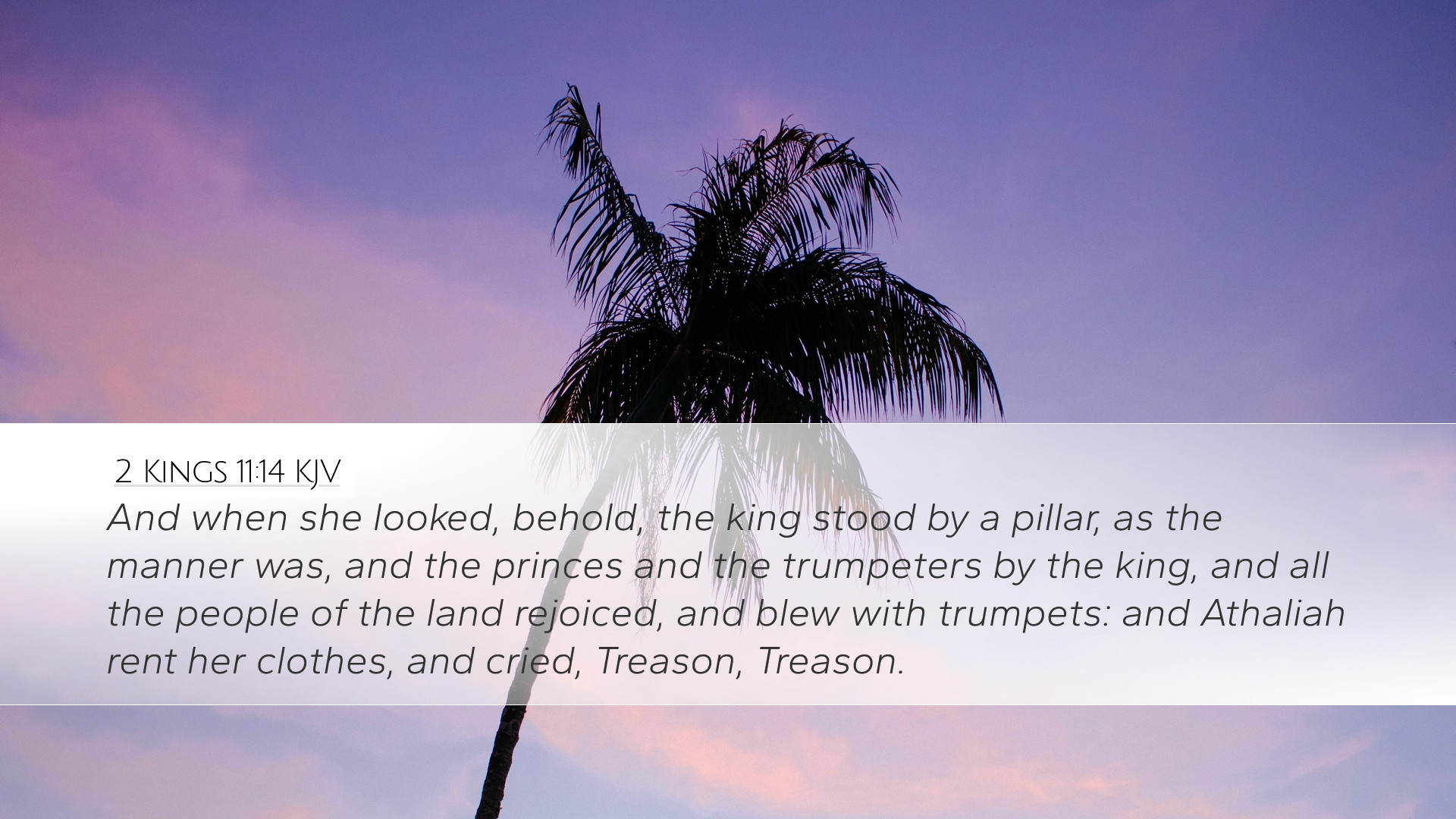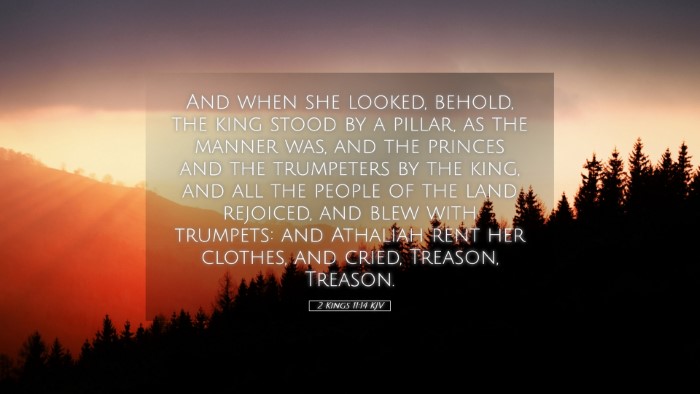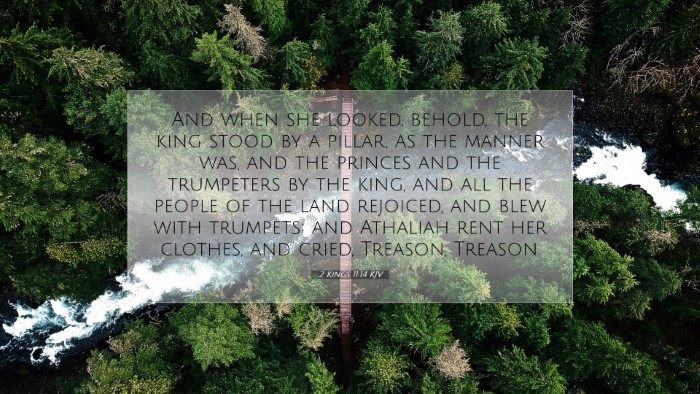Old Testament
Genesis Exodus Leviticus Numbers Deuteronomy Joshua Judges Ruth 1 Samuel 2 Samuel 1 Kings 2 Kings 1 Chronicles 2 Chronicles Ezra Nehemiah Esther Job Psalms Proverbs Ecclesiastes Song of Solomon Isaiah Jeremiah Lamentations Ezekiel Daniel Hosea Joel Amos Obadiah Jonah Micah Nahum Habakkuk Zephaniah Haggai Zechariah Malachi2 Kings 11:14
2 Kings 11:14 KJV
And when she looked, behold, the king stood by a pillar, as the manner was, and the princes and the trumpeters by the king, and all the people of the land rejoiced, and blew with trumpets: and Athaliah rent her clothes, and cried, Treason, Treason.
2 Kings 11:14 Bible Commentary
Commentary on 2 Kings 11:14
Verse: "And when she looked, behold the king stood by a pillar, as the manner was, and the princes and the trumpeters by the king, and all the people of the land rejoiced, and blew with trumpets: and Athaliah rent her clothes, and cried, Treason, Treason."
Introduction
The narrative of 2 Kings 11:14 encapsulates a pivotal moment in the history of Judah during the reign of Athaliah. As authoritative regent, she represented a time of peril for the Davidic line, characterized by idolatry and moral decline. However, this verse marks the restoration of rightful leadership under Joash, showcasing the triumph of divine providence over human scheming.
Contextual Background
This verse occurs during a coup orchestrated by Jehoiada the priest—an essential act of fidelity to God's covenant. Athaliah had usurped the throne following the death of her son, Ahaziah, and had ordered the execution of all potential heirs to secure her power. This desperate act led to direct contravening of God's purposes, as the promise of David's lineage was under threat.
Historical Insight
Athaliah's reign was marked by extreme avarice for power, leading to a crisis of faith amongst the people of Judah. Her influence shifted the worship from Yahweh to Baal, causing a spiritual decline. The priest Jehoiada's action in bringing forth Joash symbolizes hope and restoration.
Analysis of the Verse
In 2 Kings 11:14, the moment of revelation arrives when Athaliah sees the young king Joash publically proclaimed. This event signifies not just a change of leadership, but a return to the rightful worship of Yahweh and a restoration of the covenantal faith that had weakened under her dominion.
Athaliah's Response
Athaliah's tearing of her garments and her cries of "Treason, Treason!" reflect her shock and anger—a visceral reaction to the loss of power. This act was not merely a display of anguish, but also served to signify a pivotal transition in authority.
- Symbolic Gesture: The tearing of garments, common in ancient Israel as a sign of mourning or shock, confirms her position as a usurper confronted with the reality of her actions.
- Claim of Treason: Her declaration of treason indicates the desperation in her attempt to delegitimize the rightful claim of Joash under God’s plan, showcasing the lengths she would go to protect her reign.
Theological Significance
This scripture emphasizes key theological themes such as:
- Divine Sovereignty: God's unwavering commitment to His covenant promises ensures that the line of David will not be extinguished despite human efforts to thwart it.
- Restoration: The anointing of Joash represents rejuvenation not only in leadership but in the communal identity of the Israelites as bearers of God’s promises.
- Judgment and Reformation: Athaliah's reign culminates in divine judgment, revealing that human sinfulness is met with God’s intention for righteousness to prevail.
Implications for Contemporary Believers
The vivid drama in 2 Kings 11:14 carries implications for modern believers in several respects:
- Trust in God’s Plans: The events encourage believers to trust in God's plans and timing. Just as the line of David was preserved, so too can we have faith in the unfolding of God’s purposes in our lives.
- Response to Evil: Like Jehoiada, Christians are called to stand against injustice and to seek reform where godlessness prevails, championing righteous leadership and practices.
- Community and Worship: The public proclamation of Joash reinstates the value of corporate worship—an essential theme for communities of faith striving to honor God collectively.
Conclusion
In summary, 2 Kings 11:14 serves as a powerful testament to the drama of divine providence in a time of turmoil. The act of Athaliah, her resulting despair, and the joyful acclamation of Joash underlines the tension between human schemes and divine sovereignty. It reminds us as believers of the importance of faith, not only in personal contexts but also in communal worship, work, and the pursuit of justice.


